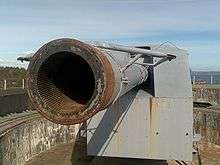bore
English
Pronunciation
- (General American) IPA(key): /bɔɹ/
- (Received Pronunciation) IPA(key): /bɔː/
- (rhotic, without the horse–hoarse merger) IPA(key): /bo(ː)ɹ/
- (non-rhotic, without the horse–hoarse merger) IPA(key): /boə/
Audio (US) (file) - Rhymes: -ɔː(ɹ)
- Homophones: boar, Bohr, boor (accents with the pour–poor merger)
Etymology 1
From Middle English boren, from Old English borian (“to pierce”), from Proto-Germanic *burōną. Compare Danish bore, Norwegian Bokmål bore, Dutch boren, German bohren, Old Norse bora. Cognate with Latin forō (“to bore, to pierce”), Latin feriō (“strike, cut”) and Albanian birë (“a hole”). Sense of wearying may come from a figurative use such as "to bore the ears"; confer German drillen.
.png)
Verb
bore (third-person singular simple present bores, present participle boring, simple past and past participle bored)
- (transitive) To inspire boredom in somebody.
- Shakespeare
- He bores me with some trick.
- Carlyle
- […] used to come and bore me at rare intervals.
- Shakespeare
- (transitive) To make a hole through something.
- Shakespeare
- I'll believe as soon this whole earth may be bored.
- Shakespeare
- (intransitive) To make a hole with, or as if with, a boring instrument; to cut a circular hole by the rotary motion of a tool.
- to bore for water or oil
- An insect bores into a tree.
- (transitive) To form or enlarge (something) by means of a boring instrument or apparatus.
- to bore a steam cylinder or a gun barrel; to bore a hole
- T. W. Harris
- short but very powerful jaws, by means whereof the insect can bore […] a cylindrical passage through the most solid wood
- (transitive) To make (a passage) by laborious effort, as in boring; to force a narrow and difficult passage through.
- to bore one's way through a crowd
- John Gay
- What bustling crowds I bored.
- (intransitive) To be pierced or penetrated by an instrument that cuts as it turns.
- This timber does not bore well.
- (intransitive) To push forward in a certain direction with laborious effort.
- Dryden
- They take their flight […] boring to the west.
- Dryden
- (of a horse) To shoot out the nose or toss it in the air.
- (Can we find and add a quotation of Crabb to this entry?)
- (obsolete) To fool; to trick.
- Beaumont and Fletcher
- I am abused, betrayed; I am laughed at, scorned, / Baffled and bored, it seems.
- Beaumont and Fletcher
Synonyms
- (make a hole through something): see also Thesaurus:make hole
Antonyms
Translations
|
|
|
|

Noun
bore (plural bores)
- A hole drilled or milled through something, or (by extension) its diameter.
- the bore of a cannon
- Francis Bacon
- the bores of wind instruments
- The tunnel inside of a gun's barrel through which the bullet travels when fired, or (by extension) its diameter.
- A tool, such as an auger, for making a hole by boring.
- A capped well drilled to tap artesian water. The place where the well exists.
- One who inspires boredom or lack of interest.
- Something that wearies by prolixity or dullness; a tiresome affair.
- Hawthorne
- It is as great a bore as to hear a poet read his own verses.
- Hawthorne
- Calibre; importance.
- Shakespeare
- Yet are they much too light for the bore of the matter.
- Shakespeare
Synonyms
- See also Thesaurus:bore
Translations
|
Etymology 2
From Middle English *bore, bare, a borrowing from Old Norse bára (“billow, wave”). Cognate with Icelandic bára, Faroese bára.
Noun
bore (plural bores)
Translations
Etymology 3
Cornish
Czech
Etymology 1
Pronunciation
- IPA(key): /borɛ/
- Rhymes: -orɛ
- Hyphenation: bo‧re
Etymology 2
References
- Čmejrková, Světla; Hoffmannová, Jana; Klímová, Jana (2013) Čeština v pohledu synchronním a diachronním (in Czech), →ISBN, page 433
Dutch
Pronunciation
Audio (file)
French
Pronunciation
- IPA(key): /bɔʁ/
Further reading
- “bore” in le Trésor de la langue française informatisé (The Digitized Treasury of the French Language).
Middle English
Alternative forms
Pronunciation
- IPA(key): /ˈbɔːr(ə)/
Noun
bore (plural bores)
References
- “bōre (n.(1))” in MED Online, Ann Arbor, Mich.: University of Michigan, 2007, retrieved 2018-07-22.
Etymology 2
From Old English borian.
Etymology 3
From Old English bār.
Norwegian Bokmål
Verb
bore (imperative bor, present tense borer, simple past and past participle bora or boret, present participle borende)
Derived terms
Norwegian Nynorsk
Welsh
Etymology
From Proto-Celtic *bāregos (“morning”). Compare Breton beure, Old Irish bárach (whence i mbárach (“tomorrow”), modern Irish amáireach and amárach).
Pronunciation
- (North Wales) (standard) (colloquial) IPA(key): /ˈbɔrɛ/
- (North Wales) (colloquial) IPA(key): /ˈbɔra/
- (South Wales) IPA(key): /ˈboːrɛ/, /ˈbɔrɛ/
Audio (file)
Derived terms
- bore da (“good morning”)